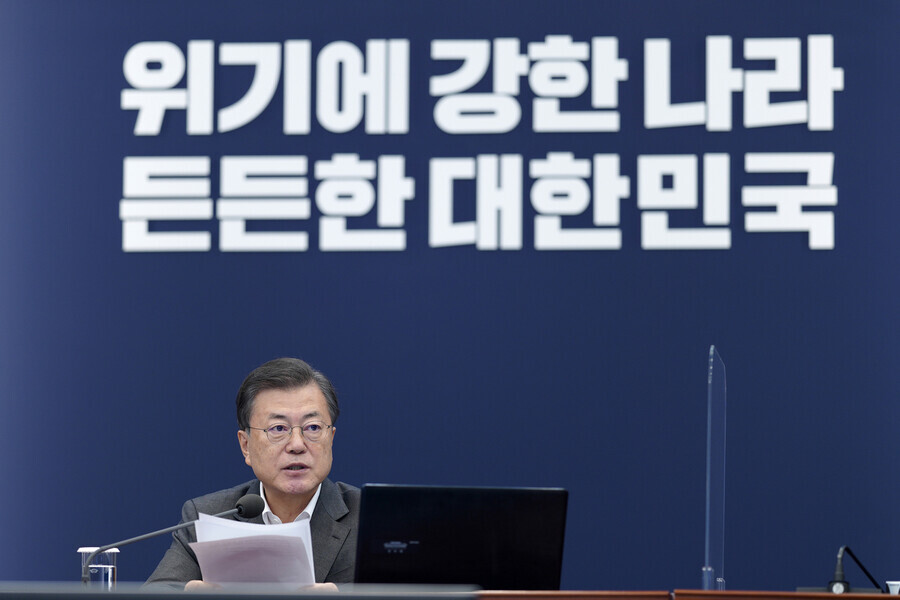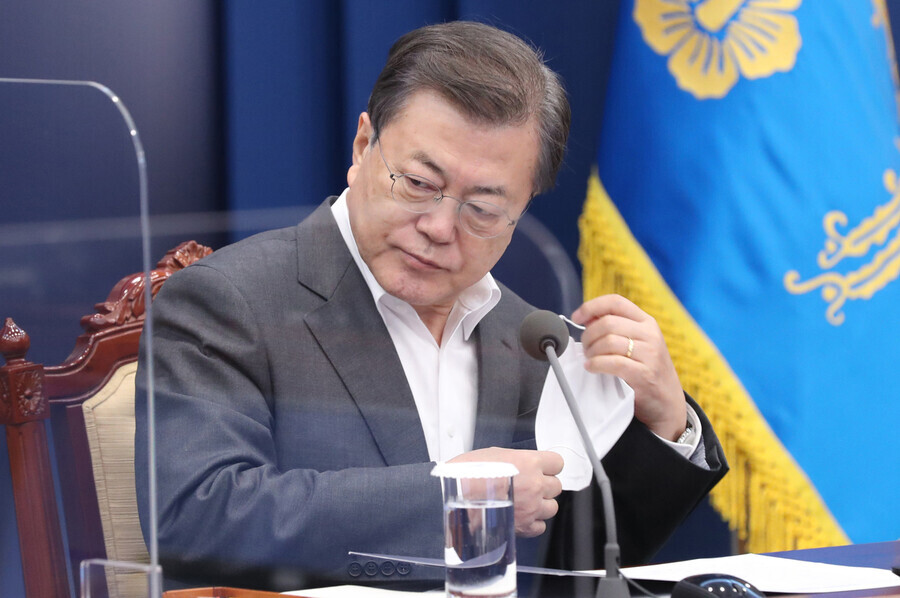hankyoreh
Links to other country sites 다른 나라 사이트 링크
Moon, ruling party face crisis as their ratings plummet

Support ratings for the ruling Democratic Party have plummeted as approval ratings for South Korean President Moon Jae-in’s performance reach new lows. After consistently maintaining the advantage in past polls, the party has now fallen behind its opposition in support for the next presidential election.
In the past, governance approval ratings and support for the Democratic Party had yo-yoed back and forth — first with the furor surrounding then-Minister of Justice Cho Kuk in 2019, and then later amid the COVID-19 pandemic and anger over real estate prices.
But the latest situation is different, as the souring opinion toward Moon now stands to have a negative impact not just in terms of yielding control of the current political situation to the opposition, but also in determining who will succeed him as president.
The ruling party’s crisis was immediately apparent in the results of various opinion polls shared Monday, where Moon’s governance approval rating was at its lowest yet.
A survey of 2,510 voters nationwide performed by Realmeter at the request of the YTN network on March 15-19 showed 34.1% of respondents sharing a favorable assessment of Moon’s performance — down 3.6 percentage points from the week before.
The same survey showed 62.2% of respondents reporting a negative assessment, for an increase of 4.8 percentage points. In other words, positive ratings were at their lowest since Moon took office, while negative ratings were at their highest.
Administration’s first “multi-crisis” raises questions about party, Blue House response capabilities
The most notable change was observed among the 40-something voters who have traditionally represented Moon’s core support base. Among this age group, 51.8% of respondents rated his job performance negatively, compared with 46.9% sharing a positive rating.
Another troubling sign was seen in support for the ruling party, which is seen as another key indicator. The Realmeter survey findings showed the Democratic Party with a support rating of 28.1%. Down 2.0 percentage points from the week before, the rating was the lowest since Moon took office.
In contrast, the opposition People Power Party (PPP) recorded a support rating of 35.5%, up 3.1 percentage points. At 7.4 percentage points, the difference between the two parties’ supporting ratings fell outside the margin of error (±2.0 percentage points with a 95% confidence level).
Even more unsettling for the ruling party is the fact that the negative assessments of Moon and his party now threaten to shape the landscape for the next presidential election.
A large part of the reason the Democratic Party and its supporters had held relatively firm despite the series of crises was the dominant leads enjoyed by two of the party’s leading contenders for the next presidency, Gyeonggi Governor Lee Jae-myung and former party leader Lee Nak-yon.
But the recent rise in support for former Prosecutor General Yoon Seok-youl has sparked growing fears.
Results released on Monday from a survey conducted by the Korea Society Opinion Institute (KSOI) at the TBS network’s request showed Yoon with a preference rating of 39.1% — higher than the combined ratings of Lee Jae-myung in second place (21.7%) and Lee Nak-yon in third (11.9%).
The Moon administration has seen its support ratings rise and fall before — with the Cho Kuk situation, the initial COVID-19 outbreak, the row between Yoon and former Minister of Justice Choo Mi-ae, and the steep rise in real estate prices. But this marked the first time that the effects appeared to spill over beyond the party and Blue House to potentially impact the choice of the next president.
To begin with, observers are saying the situation signals growing concerns about the ruling party’s crisis response capabilities.
After Blue House Chief of Staff Noh Young-min stepped down in the wake of a controversy over his multiple home ownership and disposal of his residences, successor Yoo Young-min arrived as a “relief pitcher” with his emphasis on livelihoods and pragmatism. Nevertheless, many critics are contending that the Blue House’s political affairs capabilities have been weakened.
Lee Nak-yon had shown his ability to maintain control over the party and administration as a former prime minister and Democratic Party leader, but he stepped down in order to run for the presidency. It’s a major shakeup for the party and Blue House leadership that is supposed to be playing a leading role ahead of an important election seen as a skirmish ahead of the next year’s presidential election.
Discord has also erupted recently between the Blue House and a movement led by Democratic Party hardliners to strip the prosecutors of all investigation authority. The leadership vacuum has been blamed for the different messages coming from the Blue House and party on whether to bring in a special prosecutor to investigate the recent Korea Land and Housing Corporation (LH) scandal.
Ruling party presidential hopefuls start going separate waysWith the next presidential election just a year away, the Democratic Party’s frontrunners are facing more complicated calculations. Lee Jae-myung has remained aloof from party leadership, while Lee Nak-yon and Prime Minister Chung Sye-kyun both find themselves carefully tracking trends in public opinion.
Given the unique circumstances of each of these figures, it’s difficult for the party to get traction on tackling particular issues.
“As the outlines of the next presidential race become more clear, the figures who ought to be exercising leadership in the ruling party seem to be focusing on their own interests as presidential hopefuls,” said Eom Gyeong-yeong, director of the Zeitgeist Institute.
“This isn’t merely a reversal in support for the Democratic Party and the Blue House. Power is starting to slip away from the ruling party, since its leaders are exploring ways to succeed individually when they ought to be working together as a team.”

Also notable is that this is the first multifaceted crisis that the Moon administration has faced since Moon was propelled to power by the candlelit rallies. Many think that the political risk factors that have appeared in past years are having a cumulative effect.
Under this view, public confidence in the administration’s overall ruling ability has plummeted following a sequence of scandals and crises: the moral crisis engendered by the Cho Kuk scandal, fatigue over conflict with the prosecutors, political chaos laid bare by the resignation of former senior presidential secretary for civil affairs Shin Hyun-soo, deep distrust caused by the failure of the government’s real estate policy, and the fairness crisis triggered by a speculation scandal at the Korea Land and Housing Corporation (LH).
“The biggest reason why the candles burned so brightly in 2016 was because of a public reaction to habitual unfairness and the procedural violations of the political class. But the repeated hypocrisy of the Moon administration has continued to betray the spirit of the candlelit rallies,” said Ahn Byeong-jin, a professor of political science at the Global Academy for Future Civilizations at Kyung Hee University.
“In the sense that large numbers of moderates and even progressives have turned their backs on the Moon administration, the administration may be facing its worst crisis yet,” Ahn said.
While the Blue House has downplayed fluctuations at the polls, officials have privately conveyed their consternation.
“There’s a tangible sense that more people are latching onto the idea that [the administration] should be punished in the upcoming by-elections. Public sentiment about the real estate market continues to worsen despite all of our efforts to change the mood,” an official at the Blue House said.
In a meeting of his senior secretaries and aides at the Blue House on Monday, Moon promised to deal with the LH scandal “with the resolution that there are rivers that must be crossed and mountains that must be climbed in order to move toward a better society, a fairer and more transparent society.”
By Noh Hyun-woong, staff reporter
Please direct comments or questions to [english@hani.co.kr]

Editorial・opinion
![[Column] Season 2 of special prosecutor probe may be coming to Korea soon [Column] Season 2 of special prosecutor probe may be coming to Korea soon](https://flexible.img.hani.co.kr/flexible/normal/500/300/imgdb/original/2024/0426/3317141030699447.jpg) [Column] Season 2 of special prosecutor probe may be coming to Korea soon
[Column] Season 2 of special prosecutor probe may be coming to Korea soon![[Column] Park Geun-hye déjà vu in Yoon Suk-yeol [Column] Park Geun-hye déjà vu in Yoon Suk-yeol](https://flexible.img.hani.co.kr/flexible/normal/500/300/imgdb/original/2024/0424/651713945113788.jpg) [Column] Park Geun-hye déjà vu in Yoon Suk-yeol
[Column] Park Geun-hye déjà vu in Yoon Suk-yeol- [Editorial] New weight of N. Korea’s nuclear threats makes dialogue all the more urgent
- [Guest essay] The real reason Korea’s new right wants to dub Rhee a founding father
- [Column] ‘Choson’: Is it time we start referring to N. Korea in its own terms?
- [Editorial] Japan’s rewriting of history with Korea has gone too far
- [Column] The president’s questionable capacity for dialogue
- [Column] Are chaebol firms just pizza pies for families to divvy up as they please?
- [Column] Has Korea, too, crossed the Rubicon on China?
- [Correspondent’s column] In Japan’s alliance with US, echoes of its past alliances with UK
Most viewed articles
- 1AI is catching up with humans at a ‘shocking’ rate
- 2The dream K-drama boyfriend stealing hearts and screens in Japan
- 3‘We must say no’: Seoul defense chief on Korean, USFK involvement in hypothetical Taiwan crisis
- 4[Column] Season 2 of special prosecutor probe may be coming to Korea soon
- 5Is N. Korea threatening to test nukes in response to possible new US-led sanctions body?
- 6Is Japan about to snatch control of Line messenger from Korea’s Naver?
- 7[Column] Can we finally put to bed the theory that Sewol ferry crashed into a submarine?
- 8S. Korea “monitoring developments” after report of secret Chinese police station in Seoul
- 9Doubts remain over whether Yoon will get his money out of trip to Japan
- 10Up-and-coming Indonesian group StarBe spills what it learned during K-pop training in Seoul